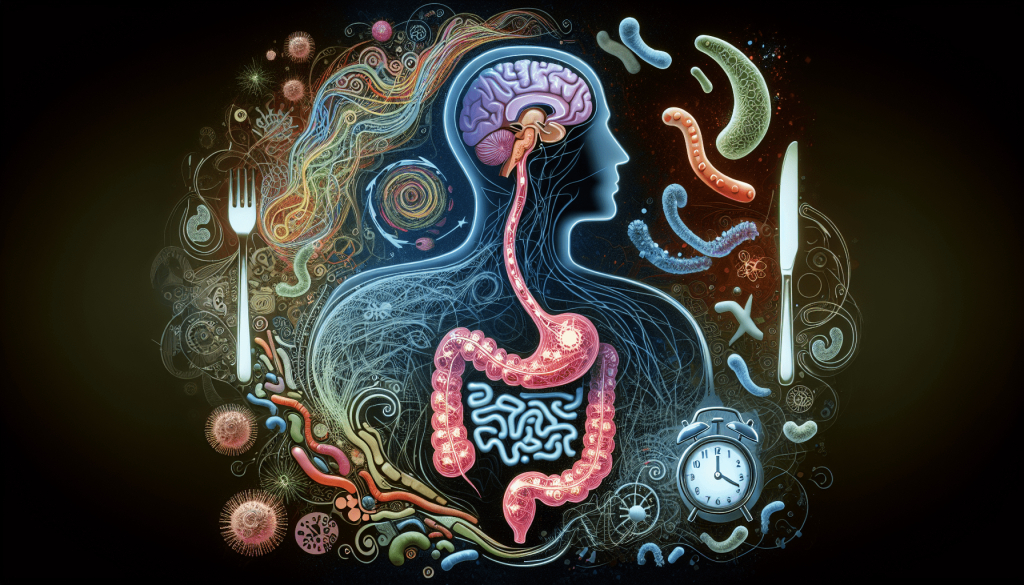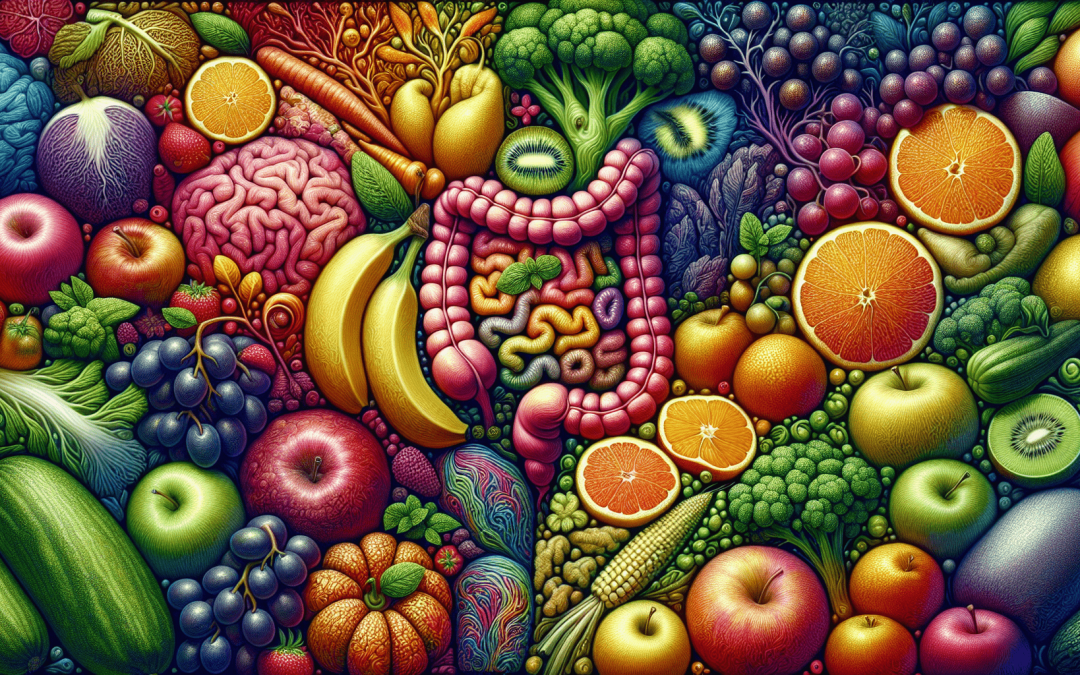Have you ever wondered about the mysterious link between your gut and your brain? Turns out, they are more closely connected than you might think. The Gut-Brain Connection reveals the fascinating relationship between gut health and our mental well-being. Recent research has unveiled the profound impact that our gut microbiome, the community of microorganisms residing in our digestive system, has on our brain function and emotions. This enlightening article will take you on a journey through this intricate connection, unveiling the surprising ways our gut health can influence our mood, cognition, and overall mental health. Get ready to discover the secrets of the Gut-Brain Connection!
The Gut-Brain Connection

Introduction to the Gut-Brain Connection
Welcome to the fascinating world of the gut-brain connection! Did you know that your gut and brain are in constant communication, influencing not only your physical health but also your mental well-being? It’s true! This connection, known as the gut-brain axis, plays a crucial role in maintaining overall health and balance.
Overview of Gut Health
Before we dive into the intricacies of the gut-brain connection, let’s first understand what gut health entails. Your gut, also known as the digestive system, is comprised of the stomach, small intestine, and large intestine, among other organs. It plays a vital role in digestion, absorption of nutrients, and elimination of waste.
A healthy gut is characterized by a diverse and balanced gut microbiota, the collection of microorganisms that reside in your digestive tract. These microorganisms, which include bacteria, viruses, and fungi, have a profound impact on your gut health and overall well-being.
The Role of the Gut Microbiota
The gut microbiota plays a crucial role in maintaining gut health and influencing various bodily functions. These microorganisms help break down food, produce essential vitamins, regulate metabolism, and protect against harmful pathogens. They even play a role in shaping your immune system.
Moreover, the gut microbiota produces neurotransmitters, the chemical messengers that facilitate communication between nerve cells. These neurotransmitters have a direct impact on brain function and mood regulation. In fact, it is estimated that approximately 95% of serotonin, a neurotransmitter often associated with happiness and well-being, is produced in the gut.
The Gut-Brain Axis
Now, let’s explore the fascinating gut-brain axis. The gut-brain axis refers to the bidirectional communication system between the gut and the brain. It involves a network of neurons, hormones, and chemical messengers that allow constant communication and coordination between these two vital organs.
Through this axis, signals are sent from the gut to the brain, influencing emotions, behavior, and cognition. Conversely, the brain also sends signals to the gut, impacting digestion, gut motility, and overall gut health. This intricate connection showcases the profound influence that the gut has on the brain and vice versa.

Communication between the Gut and the Brain
So, how exactly do the gut and brain communicate? There are several pathways through which this communication takes place.
One key pathway is the vagus nerve, which serves as a direct communication link between the gut and the brain. This nerve transmits signals from the gut to the brain, relaying information about the gut’s state and function. Additionally, the gut microbiota produces metabolites that can travel through the bloodstream and reach the brain, influencing its function.
Moreover, the gut also releases hormones and neurotransmitters that affect brain activity. For example, the gut releases ghrelin, a hormone that regulates hunger, and leptin, a hormone involved in regulating satiety. These hormones can influence food cravings, appetite, and mood.
Effects of Gut Health on Mental Health
Now that we understand how the gut and the brain communicate, let’s explore the impact of gut health on mental well-being. Growing evidence suggests that an imbalance in gut microbiota, known as dysbiosis, may be linked to various mental health conditions, including anxiety, depression, and even neurodevelopmental disorders like autism.
Studies have shown that individuals with certain mental health conditions often have imbalances in their gut microbiota. Furthermore, when these imbalances are addressed through interventions such as probiotics, there is a measurable improvement in mental health symptoms.
Additionally, the gut microbiota’s role in producing neurotransmitters, such as serotonin and dopamine, further highlights its influence on mental health. Serotonin, in particular, is often associated with mood regulation, and an imbalance in its production may contribute to depressive symptoms.

Impact of Stress on the Gut-Brain Connection
Stress, a common part of modern life, can have a significant impact on the gut-brain connection. When you experience stress, your body releases stress hormones, such as cortisol, which can disrupt the balance of the gut microbiota.
Furthermore, chronic or prolonged stress can impair gut function and increase gut permeability, commonly referred to as “leaky gut.” This can allow harmful substances and toxins to enter the bloodstream, triggering inflammation and potentially contributing to mental health conditions.
On the other hand, chronic stress can also disrupt the gut-brain communication, leading to alterations in mood, cognition, and behavior. It’s a vicious cycle, as stress can negatively impact gut health, and compromised gut health can further exacerbate stress levels.
Nutritional Strategies for a Healthy Gut
Maintaining a healthy gut is essential for optimal physical and mental well-being. A key aspect of achieving a healthy gut is through proper nutrition. Here are some nutritional strategies that you can incorporate into your lifestyle:
- Eat a diverse diet: Consuming a variety of fruits, vegetables, whole grains, and lean proteins ensures that your gut receives a wide array of nutrients and fiber, promoting a healthy gut microbiota.
- Include fermented foods: Foods like yogurt, sauerkraut, and kimchi contain beneficial bacteria that can support a healthy gut microbiota.
- Limit processed foods: Highly processed foods often lack the necessary nutrients and can disrupt the balance of gut microbiota. Opt for whole, unprocessed foods whenever possible.
- Stay hydrated: Drinking an adequate amount of water helps maintain optimal gut function and ensures efficient digestion.
- Manage portion sizes: Overeating can put extra strain on your digestive system. Practice mindful eating and listen to your body’s cues of hunger and fullness.

Probiotics and Prebiotics
Probiotics and prebiotics are two powerful tools that can support a healthy gut microbiota.
Probiotics are live bacteria or yeasts that offer numerous benefits to the gut. They can help restore and maintain a healthy balance of gut microbiota, thereby positively impacting digestion and immune function. Probiotic-rich foods, such as yogurt, kefir, and kombucha, or probiotic supplements can be beneficial additions to your diet.
Prebiotics, on the other hand, are non-digestible fibers that serve as food for beneficial bacteria in the gut. They help promote the growth and activity of beneficial probiotics, ultimately supporting a healthy gut. Foods rich in prebiotics include garlic, onions, bananas, asparagus, and whole grains.
Lifestyle Factors for a Healthy Gut
In addition to proper nutrition, certain lifestyle factors can greatly influence gut health. Here are some suggestions for maintaining a healthy gut:
- Exercise regularly: Physical activity helps promote gut motility and overall digestive health. Aim for at least 30 minutes of moderate exercise most days of the week.
- Get enough sleep: Poor sleep can disrupt the balance of gut microbiota and negatively impact gut health. Aim for 7-9 hours of quality sleep each night.
- Manage stress: Incorporate stress-management techniques, such as deep breathing exercises, meditation, or engaging in hobbies, to reduce the impact of stress on your gut and overall well-being.
- Avoid unnecessary antibiotic use: While antibiotics are essential for treating bacterial infections, they can also disrupt the balance of gut microbiota. Use antibiotics judiciously and only when necessary.
- Stay hydrated: Drinking an adequate amount of water helps maintain optimal gut function and ensures efficient digestion.
By incorporating these lifestyle factors and nutritional strategies into your daily routine, you can support a healthy gut and foster a strong gut-brain connection. Remember, a healthy gut means a happier and healthier you!









